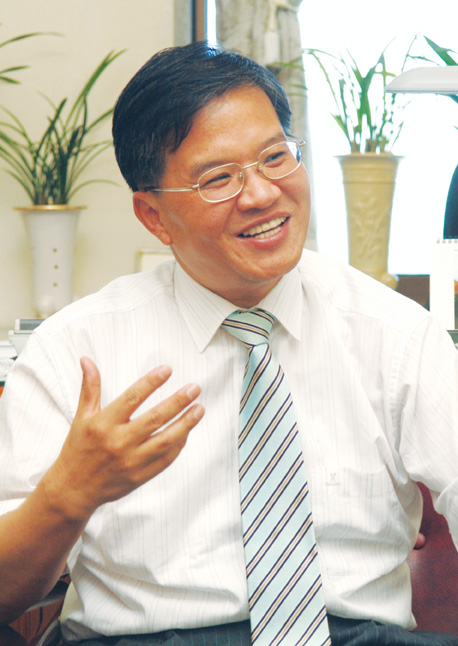Focus on Recovery of Economic and Financial Soundness
 On Oct. 1, the government turned over for parliamentary approval the draft budget for next year amounting to 291.8 trillion won, designed to kick start the economic recovery and stabilize the livelihoods of the people. The draft budget is 10 trillion won more than that of the current year, or down 3.3 percent, but it is up 2.5 percent more than this year¡¯s in terms of the basic budget, or 7.3 trillion won, as the government wants to revive the economy impacted by the global economic slump and recover the soundness of the budget by eliminating redundancy and reforming the budgetary expenditure structure.
On Oct. 1, the government turned over for parliamentary approval the draft budget for next year amounting to 291.8 trillion won, designed to kick start the economic recovery and stabilize the livelihoods of the people. The draft budget is 10 trillion won more than that of the current year, or down 3.3 percent, but it is up 2.5 percent more than this year¡¯s in terms of the basic budget, or 7.3 trillion won, as the government wants to revive the economy impacted by the global economic slump and recover the soundness of the budget by eliminating redundancy and reforming the budgetary expenditure structure.
In the meantime, contentious issues in debating the draft budget for next year include the timing of the exit policies, national debts and the soundness of the budget, the budget for the Four Rivers Restoration Project and Sejong City, the welfare budget, the financial conditions for local autonomous governments and tax reductions.
Other issues that will draw the attention of the legislators, especially on the other side of the parliamentary aisle, include the BTL (build-test-lease) system of private investors investing in public facilities like highways and bridges and operating them for fees and then turning the facilities over to the government at the end of a set time period.
The Bank of Korea has kept the key interest rate at 2 percent for nine months now to help the economy resurge. The government approved a 28.4 trillion won supplementary budget as part of the stimulus package, which brightened the prospects for economic recovery, but in some corners exit strategies are being called for to head off the various harmful side effects from the stimulus packages.
The government projects next year¡¯s economic growth at 4 percent, but is very cautious about exit strategies as they could fan uncertainties if not correctly taken and believes they should be taken when the economy is clearly moving out of the slump and inside the boundary of international cooperation.
But the budget deficits that need government control are projected at 51 trillion won this year and 32 trillion won next year. Some insist that government expenditures should be reduced further than government plans, which will create heated debates.
Deficits that need control would be cut to 32 trillion won next year or 2.9 percent of GDP from 52 trillion won or 5 percent of GDP this year. National debts would increase to 407.1 trillion won next year or 36.9 percent of GDP and 366 trillion won this year or 35.6 percent of GDP. The government expects to cover the budget deficit by issuing 30.9 trillion won worth of government bonds.
What is expected to attract intense debate is that government revenue would be reduced by 23.2 trillion won next year, which is about 75 percent of the bonds that the government plans to issue next year. On top of that, the government plans to cut taxes.
The 30.6 percent margin of increase in the national debt next year is also likely to draw the attention of the opposition parties in the National Assembly, as it is the highest among OECD member countries.
Such issues as the reduction of tax-exemptions and the sale of government stakes in state-held firms to increase government revenue would also likely invite clashes between the ruling and opposition parties, especially on ways to secure a sound government treasury.
However, what is likely to create the most heated debate on the floor will be the funding for the Four Rivers Restoration Project. The center of the clash will be the difference of required funds that the government projects. The government now says the cost will be around 15.4 trillion won by 2012, but said it would need 22.2 trillion won back in September.
What makes the project contentious is that it needs such a large amount of funding and some legislators fear that budget allocations for other projects would be reduced due to the river project, arousing questions on the government¡¯s funding priorities.
Opposition will likely question the results of a survey on environmental effects and a survey on the need for the project, flood damages if the project is not carried out, the funds to be provided by the Korea Water Resources Corp. estimated at 8 trillion won and the impact the project will have on funds to be allocated to other SOC projects. These contentious factors will be the major subjects of the parliamentary debate on next year¡¯s budget. nw
By Choo Young-jin, Senior Staff Director, The National Assembly Special Committee On Budget and Accounts
3Fl, 292-47, Shindang 6-dong, Chung-gu, Seoul, Korea 100-456
Tel : 82-2-2235-6114 / Fax : 82-2-2235-0799